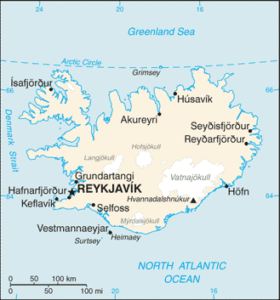 It is widely assumed that the first Jews to travel to Iceland were traders and merchants who arrived as early as 1625. Most of these merchants came from Denmark, and trade continued during the 18th and 19th centuries. Few Jews lived in Iceland as there was no economic or personal incentive for Jews to immigrate to Iceland.
It is widely assumed that the first Jews to travel to Iceland were traders and merchants who arrived as early as 1625. Most of these merchants came from Denmark, and trade continued during the 18th and 19th centuries. Few Jews lived in Iceland as there was no economic or personal incentive for Jews to immigrate to Iceland.
It was a country where the practice of a non-Christian faith was not tolerated. Jewish immigration to Iceland did not really begin until the mid-1930s, when Jewish refugees from Europe began arriving in the country.The term for Jew in the Icelandic language is Gyoingar, which holds negative connotations.
Most of the refugees moved on to other countries, and some were even expelled or deported due to antisemitism. In the postwar period, Jews living in Iceland remained an isolated group. They quickly realized that it was best to keep a low profile. Throughout the late 1930s, Icelanders became increasingly hostile to Jews living within their borders, and treated them poorly.
 It was not until 1940, when British forces arrived in Iceland with some Jewish soldiers in their ranks, that the first official congregation was established in Reykjavik. A service was held in 1940 that included 25 servicemen from Britain, Canada, and Scotland on Yom Kippur in a lodge that belonged to the Good Templars. They used a borrowed Torah scroll, the only one available in Reykjavik, and had two prayer shawls and one skullcap. This service was the first non-Christian religious ceremony to take place in Iceland in 940 years.
It was not until 1940, when British forces arrived in Iceland with some Jewish soldiers in their ranks, that the first official congregation was established in Reykjavik. A service was held in 1940 that included 25 servicemen from Britain, Canada, and Scotland on Yom Kippur in a lodge that belonged to the Good Templars. They used a borrowed Torah scroll, the only one available in Reykjavik, and had two prayer shawls and one skullcap. This service was the first non-Christian religious ceremony to take place in Iceland in 940 years.
Jewish life became much more active after the arrival of American troops to Iceland in 1941-1942. An American rabbi arrived in the country in late 1941, and a few years later, in 1944, there were 500 Jews present at a Rosh Hashanah service that took place at Naval Air Station Keflavik with a Torah scroll flown in from the United States.
In 1944, about 2,000 Jewish servicemen were stationed in Iceland. A rabbi was present in Keflavik for a few years after 1944, and two Jewish congregations existed until the mid-1950s. Most of Iceland’s Jews are Israeli, European or American immigrants who are married to native Icelanders; there are only a handful of fully Jewish couples in the country.
Iceland, does not have a very rich history of Jewish culture. It is estimated that there are currently 250 Jews living in Iceland, mostly residing in the capital city of Reykjavik.